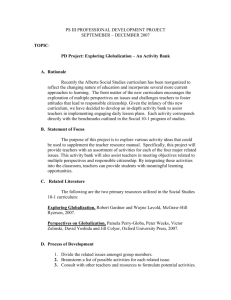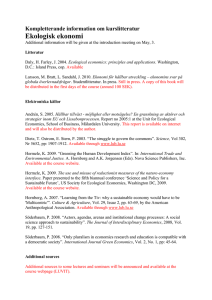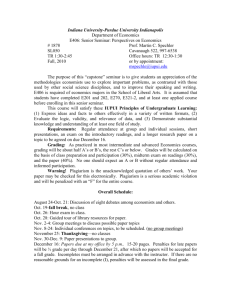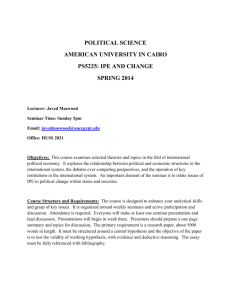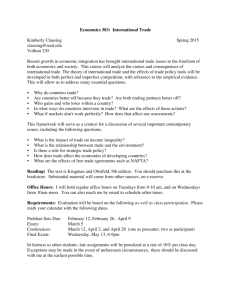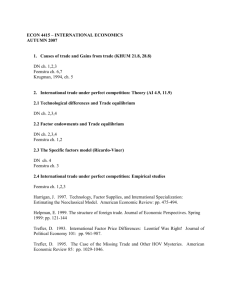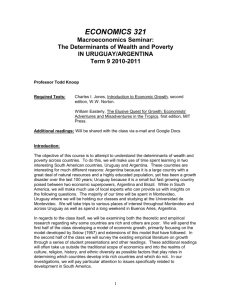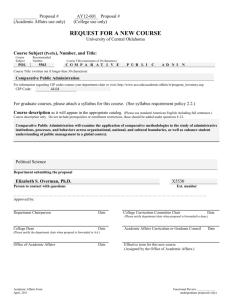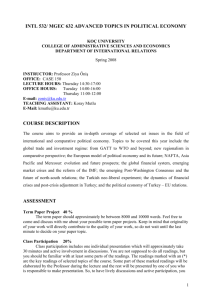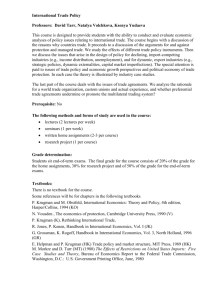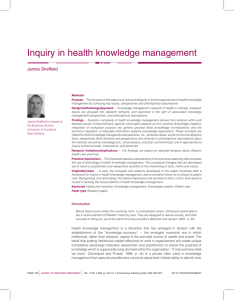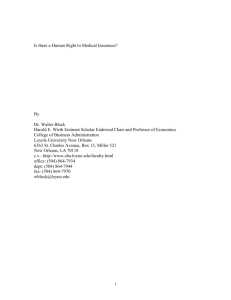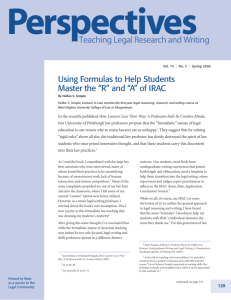Course description - Rutgers Business School
advertisement
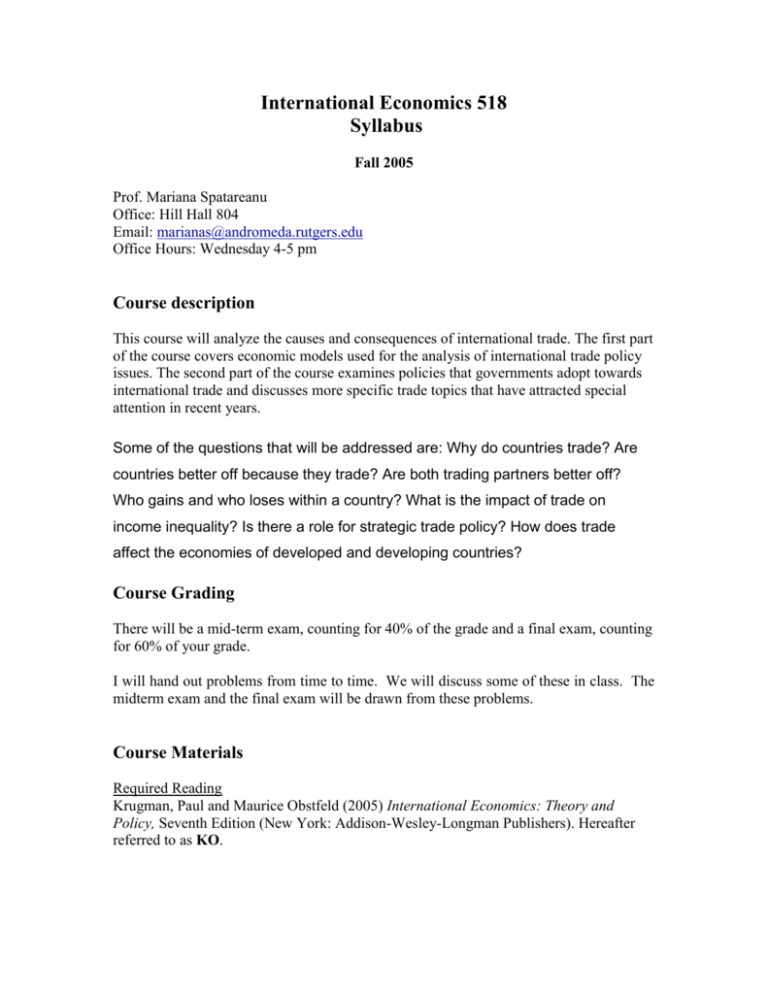
International Economics 518 Syllabus Fall 2005 Prof. Mariana Spatareanu Office: Hill Hall 804 Email: marianas@andromeda.rutgers.edu Office Hours: Wednesday 4-5 pm Course description This course will analyze the causes and consequences of international trade. The first part of the course covers economic models used for the analysis of international trade policy issues. The second part of the course examines policies that governments adopt towards international trade and discusses more specific trade topics that have attracted special attention in recent years. Some of the questions that will be addressed are: Why do countries trade? Are countries better off because they trade? Are both trading partners better off? Who gains and who loses within a country? What is the impact of trade on income inequality? Is there a role for strategic trade policy? How does trade affect the economies of developed and developing countries? Course Grading There will be a mid-term exam, counting for 40% of the grade and a final exam, counting for 60% of your grade. I will hand out problems from time to time. We will discuss some of these in class. The midterm exam and the final exam will be drawn from these problems. Course Materials Required Reading Krugman, Paul and Maurice Obstfeld (2005) International Economics: Theory and Policy, Seventh Edition (New York: Addison-Wesley-Longman Publishers). Hereafter referred to as KO. Optional One of the most influential trade economists proves that the antiglobalization movement has exaggerated claims that globalization has done little good for poor countries: Jagdish Bhagwati (2004) In Defense of Globalization, (Oxford University Press). A Nobel Prize winner and former chief economist and senior vice-president at the World Bank, Joseph Stiglitz presents a critical analysis of the main institutions that promote globalization--the International Monetary Fund, the World Bank, and the World Trade Organization: Joseph Stiglitz (2003) Globalization and Its Discontents (W.W. Norton & Company). Course outline Session 1. What Is International Economics About? World Trade Overview Chapters 1-2 - KO Krugman, Paul. "Growing World Trade: Causes and Consequences." Brookings Papers on Economic Activity. 1995, 1, 327-342. Session 2. Comparative Advantage: The Ricardian Model Chapter 3 - KO Daniel M. Bernhofen and John C. Brown. “A Direct Test of the Theory of Comparative Advantage: The Case of Japan”, Journal of Political Economy, 2004, Vol. 112, 1, 48-67. Sessions 3-4. Specific Factors and Income Distribution. Resources and Trade: The Heckscher-Ohlin Model Chapter 4 - KO Paul Krugman. “Does Third World Growth Hurt First World Prosperity?” Harvard Business Review (July-August 1994), 113-121. Markusen, et al. International Trade: Theory and Evidence. 1996. chapter 14: "Empirical Studies of Comparative Advantage Models," 216-228. Session 5. The Standard Trade Model Chapter 5 - KO Sessions 6-7. Economies of Scale, Imperfect Competition, and International Trade Chapter 6 - KO Elhan Helpman. “The Structure of Foreign Trade”, Journal of Economic Perspectives, Vol. 13, No.2 (1999), 121-144. Session 8. Midterm exam Session 9. International Factor Movements. Migration and Foreign Direct Investment. Chapter 7- KO Carkovic and Levine. “Does Foreign Direct Investment Accelerate Economic Growth?”, June 2002. U of Minnesota Department of Finance Working Paper. Beata S. Javorcik, 2004. “Does Foreign Direct Investment Increase the Productivity of Domestic Firms? In Search of Spillovers through Backward Linkages,” American Economic Review, 94(3): 605-627. Jeffrey G. Williamson. “Globalization, Labor Markets and Policy Backlash in the Past”, Journal of Economic Perspectives, Vol. 12, No.4 (1998), 51-72. Session 10. The Instruments of Trade Policy Chapter 8 - KO Gary Clyde Hufbauer and Kimberly Ann Elliot. Measuring the Costs of Protection in the United States. Washington DC: Institute for International Economics, 1994. Anne O. Krueger. “Are Preferential Trading Arrangements TradeLiberalizing or Protectionist?”, Journal of Economic Perspectives, Vol. 13, No. 4 (1999), 105-124. Feenstra, Robert C. "How Costly is Protectionism?" Journal of Economic Perspectives, Summer 1992, 159-178. Session 11. The Political Economy of Trade Policy Chapter 9 – KO Robert E. Baldwin. “The Political Economy of Trade Policy”, Journal of Economic Perspectives, Vol.3, No.4 (1989), 119-135. Markusen, et al. International Trade: Theory and Evidence. 1996. chapter 19: "The Political Economy of Trade Policy," 324-340. Session 12. Trade Policy in Developing Countries Chapter 10 KO Paul Krugman. “Does Third World Growth Hurt First World Prosperity?”, Harvard Business Review, 1 August 1994, 113-121. L. Alan Winters, Neil McCulloch, and Andrew McKay. “Trade Liberalization and Poverty: The evidence so far”, Journal of Economic Literature, Vol. XLII (March 2004), 72-115. Session 13. Controversies in Trade Policy Chapter 11 - KO Dani Rodrik. “How Far Will International Economic Integration Go?”, Journal of Economic Perspectives, Vol.14, No.1 (2000), 177-186. Robert C. Feenstra. “Integration of Trade and Disintegration of Production in the Global Economy”, Journal of Economic Perspectives, Vol. 12, No.4 (1998), 31-50.

